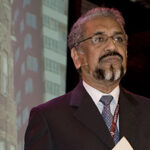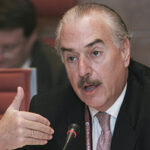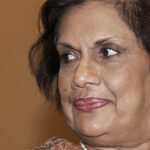The speakers touched on elements that are necessary and taken together they may indicate the requirements of an inclusive society, such as fulfilling employment – while there is a lot of unemployment in the region the greater problem is underemployment and the lack of opportunity to have fulfilling and meaning work. Therefore there is a need for better education, greater integration of the marginalised into the mainstream economy and support for small scale enterprises. In this way the marginalised people are not only more satisfied but they become contributors to economic progress and not a drain on the state. Recognition, acceptance and inclusion is also very important. One telling phrase was used by one speaker who spoke of migrant workers who contribute significantly to the local economy but are told “don’t show your face after dark. It is important that peoples’ grievances are recognised even if it proves difficult to deal with them. It was also pointed out that these grievances are often made more stark by the existence of great inequality within one area and conspicuous consumption – what might be called “provocative inequality”.
What about the opportunities? Many people find that they have no opportunity to fulfil their aspirations. They are blocked by poverty and prejudice on grounds of religion, ethnicity, cast or language. This is why access to education and employment are important but it also requires a change of attitude in the wider community to accepted and respected marginalised communities and individuals and facilitate their participation in society. A stake in society is needed: The marginalised have no influence and feel their contribution is of no importance. Therefore it is not surprising that they have no commitment to the society and therefore make no contribution to maintaining the existing order which does not work for them and may even try to undermine it. Finally, don’t forget the voice: People need to be able to express themselves and be head but this is often not possible. Their views are not taken into account and their interests are not protected.
Some speakers categorised in other ways human needs that need to be addressed. One spoke of the need for appreciation, autonomy, status, role and affiliation, and another identified political, economic, social and cultural recognition. The Commitments of the Shared Societies Project were also referred to as elements which needed to be addressed in achieving a Shared or Inclusive Society
It was noted that often youth and women are most excluded and in different ways there exclusion particularly undermines society: women because they provide the foundation for the family and community and cannot do that if they are ignored; and young people because they are more likely to act out their frustrations.
Among the solutions presented by the participants, it’s clear that understanding what people need, helps to identify solutions. The conference did not unearth specific solutions but did develop ideas that point the way forward.
Voice means participation. A number of speakers identified democracy as a basic requirement. But some reservations were expressed, as democracy is not always meaningful, and often does not really give people influence or a sense that they are involved. One person spoke of “democracy that delivers” which is a tagline of the Club de Madrid.
As well as voice, economy democracy and economic participation is needed. Various measures were identified. It was noted that there is capital available in the region but it is important to make initiatives that are inclusive and sustainable more attractive and to ensure that resources flow towards the countries and the people that are most disadvantaged. Micro credits were also mentioned as a means to facilitate economic participation by new start up entrepreneurs from marginalised communities. Collective action also plays a part.
Social protection schemes seems to make an appropriate contribution to a more inclusive society and they are widespread in the region (in India for example) but the conference was told that they had not had a significant impact on the levels of poverty. They were also criticised for tackling the symptoms of the problem (lack of family income) with out tackling the underlying causes of the problem. A couple of people talked about the way social protection is delivered and advocated conditional cash transfers but there was little time for an in-depth discussion of the merits of different approaches.
It was felt that the level of regional cooperation does not aid development in the region. It was argued that South Asia is the world least integrated region which goes in the face of global trends. There could be greater trade between states and greater flow of investment across the region. It was acknowledged that the smaller states in the region are threatened by the size of the Indian economy and it is the responsibility of India to address that issue and ally the fears of its neighbours.
National priorities reflect the underlying national orientation and various tensions were highlighted: development or inclusion, materialism or sustainable lifestyles, closed or open societies, control or empowerment model and security model or social engagement model.
Read the full text on the Shared Societies Blog here
President Chandrika Kumaratunga’s Keynote address at
the Conference on “Delivering Inclusive and Sustainable Development”
on 9th April at Taj Mahal Hotel , New Delhi



